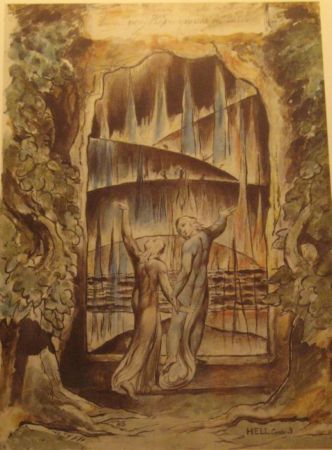THE RESEARCH IN A NUTSHELL |
O Italiani, io vi esorto alle storie
(Oh Italians, I urge you to History)
Ugo Foscolo
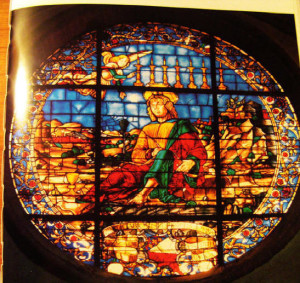
The intent of the research published on this website is to study the historical facts as truly lived by Dante. True facts are sparse in history, though this is offset by a multitude of characters that have faded due to the long silence in which they have been sealed. Historians wish to breathe new life into their characters like the prophet Ezechiel wanted to bring the dry bones back to life. It is acknowledged that there are many gaps in the information furnished by reports, files and any surviving correspondence regarding Dante.
One of the most important works to have been passed down from Christianity in the Middle Ages is the Lectura super Apocalipsim written by the Franciscan Petrus Iohannis Olivi.
Olivi was born (1248 ?) in Sérignan, in the Languedoc region of southern France that had just been burnt during the crusade against the Albigenses. After much controversy within the Order, he taught theology in the Studium of Santa Croce in Florence from 1287 to 1289. Subsequently, having moved to Montpellier, he devoted himself to composing the Lectura super Apocalipsim which he finished just before his death in Narbonne in 1298. The text circulated in Italy immediately and in 1305 Ubertino da Casale had it by his side as he wrote the Arbor vitae in La Verna. Though the Lectura was a reference book for the Spiritual Franciscans, who yearned for a reform of the Church that would reinstate the original principle of poverty, its fate was yet to be decided in the first decade of 1300. Only later, after the Council of Vienne (1311-1312) whilst the trials against the Spiritual Franciscans and the Beguins from Provence were being held, the Lectura endured a persecution beyond compare, starting from the censure ordered by Pope John XXII (1318-1319) until it was finally condemned it in 1326. Thenceforth, the Lectura super Apocalipsim has been almost forgotten for some seven hundred years and to date is still unpublished.
Many enlightening attempts to compare the Lectura with the Commedia have been made by historians such as Ernesto Buonaiuti and Raoul Manselli, though they only proved that Olivi and Dante had similar ideas regarding the reform of the Church. This investigation intends to prove that between the Friar and the Poet there was far more than a mutual feeling.
Two facts emerge from the investigation:
a) a book of scriptural exegesis (the Lectura super Apocalipsim) contains principles and criterions upon which a perspicacious reader is able to base another book that, whilst having the same contents, has been rewritten and organized in a different way. With the aid of principles that are not found in Apocalypse (the history of the Church divided into seven status or periods), a commentary, by chapters, on the last book in the Bible is transformed into a theology of history. Olivi considers the Apocalypse as a summary of the entire Bible which, in turn, is the form, example and purpose of all science.
b) a poem (the Commedia), the verses of which are written by transforming semantic elements found in the theology of history, almost “come buon sartore / che com’ elli ha del panno fa la gonna” (as a good tailor who makes the gown according to the cloth) (Paradiso XXXII, 140-141). There is no tracing or rewriting, it is merely a metamorphosis. The conversion of the Lectura into the Commedia is not immediately apparent, since the words and themes have abundantly been freely adapted to the new circumstances, even if a great deal of the original meaning has been maintained. However, precise and verifiable proof of a correlation between the two texts is to be found and will be illustrated on this website.
Such a metamorphosis, the visible aspect of which is a substantial intertext, makes the poem twofold. A double literal and spiritual meaning and a double way of reading it. What did Dante see in Olivi? A quite unique vision of the Church that was progressing. The Revelation of Christ does not end with the first advent. It continues and grows just like individuals develop until they reach maturity. Contrary to the vision Saint Augustine and the Fathers had of the history of mankind, Olivi thought that the world was not ageing but painfully giving birth to a new era. This, known as the “sixth period” of the Church, is marked by the second advent of Christ, not in the flesh but in the Spirit which was infused both into individuals and the last Order of contemplatives, who were also intended to be governors of the Church. An advent that is generating a novum saeculum on earth, distinct from the third advent of Christ, that of the Last Judgement.
Olivi and Dante both wrote during the sixth period that began with Saint Francis or, prophetically, with Joachim of Fiore (this period coincides in fact with the Calabrian Abbot’s third age). All former enlightenment contributes to this period just as all the malice of the past falls onto it. In the sixth period the army of Christ will suffer because of Babylon, the corrupted Church, the two antichrists (the “mystical” and the “great” one) and the pseudo-prophets. In doubt if their faith, or that of their persecutors, be the true faith they endure a modern type of martyrdom, i.e. psychological not physical. Both in the flesh (the outer voice) as in the spirit (the inner voice prepared for by the former), Christ will guide his army to victory. During the sixth period, the new followers of Christ are allowed to speak openly about what has been suggested from within. Regardless of her enemies, the heresies, the devastation brought by the Saracens and finally the great temptations and corruption, the Church, indefectible rock, will never die even when, for some mysterious divine justice, she appears nonexistent.
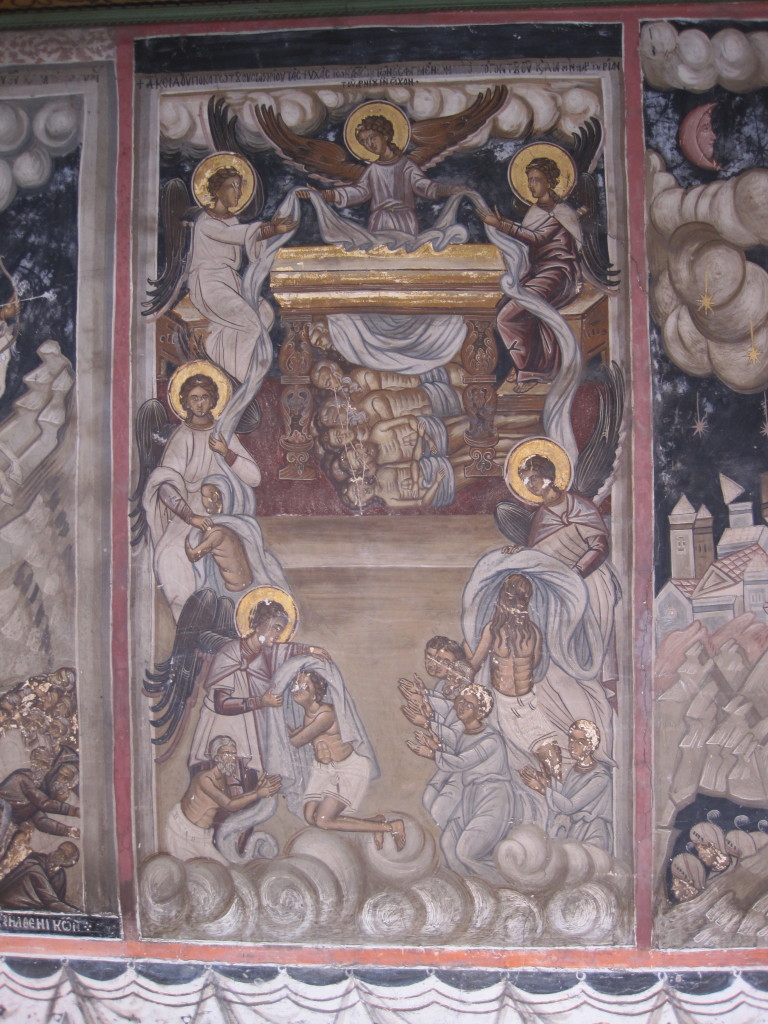
By adapting a theology of history the Commedia is converted into a “Holy Scripture”. Dante spreads Olivi’s Franciscanism universally, in various streams and over all creatures. Human needs, all that brings bliss on earth, language, politics and philosophy become gifts of God and part of providential plan. The “Sacred Poem” includes both ancient Judaism and the ancient Gentiles who are part of the “gown” sewn from the cloth which ᾿till then had swathed Holy belongings.
In a Sacred Humanism, conscientious about the facts of this world to which theological concepts and images are freely applied, Dante assigns to the Empire the nature of an everlasting institution that Olivi attributes to the Church even if it appears that there are no heirs. This leads to Marco Lombardo’s theory that Rome has two suns (Purgatorio XVI, 106-108) and that imperial authority is given directly by God with no papal intermediation, as demonstrated in the Monarchia. Dante believed that the two suns, the Empire and the Papacy, cooperated, each in its own way, to bring happiness to human beings.
The new advent of Christ, inspired by the Spirit in men who like Saint John (author of the Apocalypse) are sent to rule the Church in “lingua erudita”, enlightens the world of the ancients. The theologically “unsuitable” presence in Limbo of the ancient (before Christianity) and modern (the Mohammedan Avicenna, Averroes and Saladin) just people introduced by Dante, like when Christ descended there were the Holy Fathers and the Prophets from the Old Testament (as well as Cato) who were taken away and beatified, seems to imply that the Redemption process is still ongoing and looking at a new age of universal palingenesis and conversion which, in Dante’s case, is performed by means of poetry.
In Olivi’s opinion, God did not want all the knowledge to be revealed at once even if He knew all ab aeterno. The same journey, granted first to Aeneas then to Saint Paul and lastly to Dante, which, forcing the Divine Foresight, started prematurely on the short wings of the reason following the senses, lead Ulysses to ruin. In his last voyage, the Greek hero went with his senses to the “sixth period” of the Church, towards a shore which was then known only to God, a flight that only a “vir evangelicus” could have ever made.
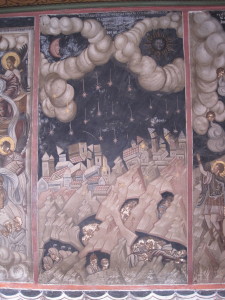
The issues raised in this investigation are new and of such importance as to require a thorough and appropriate examination and even the causes must be sought. Dante’s meticulous undertaking of transforming the semantic elements contained in Olivi’s theological text in order to attain the tercets in the vernacular, means that the new language looks upon the Latin in the biblical exegesis as both a universal and humble language. To maintain the same basic “warp” on which to work and vary during the long time it took to “sew” the verses and assign the same parts to different situations was also a technique to ensure that the poem was kept coherent.
The Divina Commedia is a universe of signs. The literal meaning contains keywords to access another text, the Lectura super Apocalipsim by Olivi. This is a technique used in the art of memory: like imagines agentes the keywords remind readers of a doctrinal book they have read before, which they mentally reread paraphrased in the vernacular, extensively updated according to the poet’s intent, in verses that lend “e piedi e mano” to the doctrine and provide contemporary and familiar exempla.
The literal sense of the “sacred poem”, intended for readers in general, also contains allegorical, moral and anagogic meanings (which Dante collectively defined as ‘mystical’ or ‘allegorical’ in his Letter to Cangrande). Dante, who considered himself a new Saint John and his work a new Apocalypse, targeted a readership of seculars, as well as preachers and Church reformers. The inner language was intended for the Spiritual Franciscans, who were indeed the only ones to have the “key” (the Lectura). In the first decade of the fourteenth century their tragic destiny was by no way marked, they were even advisors to the courts and Olivi’s works were published in the vernacular. During a “moral” Vacant See, Dante saw the Spiritual Franciscans as the authors of a reform of the Church which could not come exclusively from an emperor. The clerical readership failed to develop because the Spirituals (a loosely organised movement within the Franciscan Order), who should have known Olivi’s Lectura, were persecuted and their book-vexillum, which was censured in 1318-1319 and condemned in 1326, became clandestine and almost disappeared. However, the Commedia and the Lectura were textually related and the last witnesses, in the Christian Middle Ages, of the way individuals were placed in the world order according to the judgment of God and the history of collective salvation, before man was left alone.
The Lectura maintains that the spiritual intellect trapped in Christ’s sepulcher was freed on the day the grave stone was removed. Compared to the literal meaning, this is like the breath blown into the trumpet, the fire that lights the sea of glass like unto crystal, the rainbow combined with the clouds. The spiritual sense embedded in the literal sense of Dante’s verses is not however something strange or vague. It is made of various appropriations of words, similes and calembour. There is a “key” to open the inner meanings, almost a book inside a book, like the Apocalypse which is precisely a book “written within and without”.
Knowledge of the theological threads with which the verses were (more or less densely) – woven throughout the long period it took to make the “gown”, provides a clearer idea of the extent to which they are hermetically sealed and may even bring to life the parts of poetry that were thought dead and impossible to revive (De Sanctis), enables criticism of the unexpressed (Gramsci) and improves perception of the “echoes of Dante within Dante” (Contini). It is no longer necessary to distinguish between true poetry and structure (Croce), since even the theological concepts are a guiding principle of the poetry that adheres to them. The “Sacred Poem” is such all the way through, each spiritual life gains from the metamorphosis of the surrounding concepts and has a “figurative” power that goes beyond abstract allegory (Edoardo Sanguineti). Allegory, one of the four senses in the Bible, is no longer poet’s fiction and now has a historical value, a prefiguration of real life reflected in the journey. Investigating all the courses of a specific theology of history in order to see how the creator elaborated it is the best way to ‘detheologise’ Dante, according to Teodolinda Barolini.
The fact that a “key” exists removes any arbitrary in the identification of the inner meanings. This research provides concrete, neither esoteric nor exoteric, historical proof that statements frequently made by critics, such as Dante is a “visionary” and the “Commedia is an Apocalypse”, were correct. Said evidence may be verified by comparing the texts.
“If writing history means to make history of the present, a history book is important if in present days it helps tomorrow’s forces to become more aware of themselves, thus more active and efficient” (Gramsci). A history book to dwell upon is a comparison between texts that enlighten the origins of the Italian language and above all its universality, which even comes before the literal meaning of the words. Consequently, unlike works by other poets, Eliot thought he could read the Commedia even though he did not understand Italian. Likewise, to read a true history book is to learn, from the comparison between the two texts, that Dante considered the proud political events of Italian cities as sacred history and even a new Passion of Christ. A sacred drama that seems unbelievable, though it lived in the poet’s soul.
The spiritual language bearing the inner meanings of the poem was soon lost, if ever it had been noticed at all, leaving only the literal meaning and the host of interpretations and comments. This loss of awareness, that took place when the two worlds (Classical and Christian) lost balance and fell from the zenith to which the poet had raised them, was the first symptom of the “mediaeval autumn”. Having passed through the crucible of the “Sacred Poem” and abandoned their spiritual habit, the Ancients had again entered into the life of mankind.
Olivi was persecuted “even after his death when his bones were pitilessly unearthed and insulted, his works confiscated and destroyed, his name abhorred and never mentioned” (Manselli). It may be said that the works of Friar Petrus Iohannis Olivi produced abundant fruits, “like a grain of wheat when it falls to the ground and dies”, to use Christ’s expression in Saint John 12, 24 on which the Friar’s letter to the sons of Charles II of Anjou (who had been taken prisoners by the Aragonese) was based. Ariel, the spirit in Shakespeare’s play The Tempest, may well sing that in the immense sea of Dante’s poem Olivi’s bones had been transformed “into something rich and strange”.
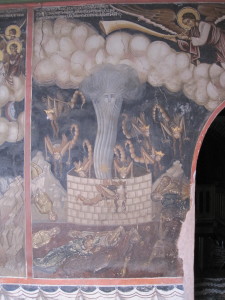
The digital publication of this research is undoubtedly invaluable for several reasons:
Since the entire Commedia (14,233 verses) has been compared with the Lectura a printed version, capable of adequately demonstrating the relationship between the texts, is unconceivable. Hyper-textual links and coloured markings are indispensable in order to illustrate the cyclical presence in the verses of the semantic elements related to each of Olivi’s seven periods. Since research is expected to be continued for quite some time, any further results will be constantly published. The amount of space available and the clearness of the electronic version enables us to work on kind of archaeology of the text and to discover and illustrate the deepest meanings of the “Sacred Poem”. Thus the imperceptible truth, once lost by the author’s contemporaries, becomes accessible to all. The investigation of the relationship between Dante and Olivi will not be restricted to a mere comparison (as much as this shall prevail) between the Lectura super Apocalipsim and the Commedia. Said comparison alone involves a review of all of Dante’s works. The virtual meeting with the Friar on the road to Dante’s exile was probably preceded by an actual meeting in Santa Croce (where Olivi taught between 1287-1289) precisely in the years before the death of Beatrice (1290). These were the years in which the “nove rime” were published. Such an investigation is still to be performed and the initial results will be published on this website.
This website intends to thoroughly investigate the subject matter and so prove that the ancient value of research is not yet dead. Readers will find and may freely consult publications that will be constantly revised and increased together with all the instruments needed to confirm the results. The publications will not be mere essays but rather logbooks which will enable other investigators to continue a journey that had never been attempted before. By verifying the results and taking the research further, other investigators may reach better results than those produced by an author who ventured into a study that is now beyond his power. May the words of Bruno Nardi, who thought that to try to understand Dante’s way of thinking was as attempting as to climb a steep slope on a mountaintop in the Dolomites, be of warning: “he who endures the fatigue of climbing this steep slope will be able to enjoy the vast panorama seen from up there and hear the heavenly harmony that delights the ears of those who learnt to raise themselves above the worldly senses”. Those who ascend from this side will hear these sounds for the first time.
In addition to the devoted masters of history whom I met in Rome’s Istituto Storico Italiano per il Medio Evo such as Raffaello Morghen, Raoul Manselli and Girolamo Arnaldi, I would like to express my gratitude to Ovidio Capitani, historian and Guglielmo Gorni, expert on Dante who, upon my return from a lonely voyage in the sea, were my “lighthouse on dry land” where a long battle is still to be fought. Quoting Dante, I would like to say about these old and new acquaintances that “nobilitatem ac rectitudinem sue forme pandentes, donec fortuna permisit humana secuti sunt, brutalia dedignantes”. It will be also owing to them should this investigation ever be of any value.
Nov. 26, 2013
DANTE AND PETRUS IOHANNIS OLIVI
The website www.danteolivi.com is mainly dedicated to a comparison between the Commedia and the Lectura super Apocalipsim by Olivi (finished in Narbonne in 1297; Ubertino da Casale had it by his side as he wrote the Arbor vitae in La Verna, 1305). The findings show that the relationship between the poetry and the exegesis by the Franciscan friar takes the form of a parody, meant as imitatio Scripturae, technically conducted throughout the poem.
From the correspondence between the two texts, organised according to precise and constant internal rules, the following key points emerge:
a) The “cloth” (Olivi’s Lectura), to which Dante made numerous variations whilst he made the “gown” (to use the words of Saint Bernard in Par. XXXII, 139-141), helped to maintain the unity of the poem.
b) Based on the literal sense of the Commedia, key words refer readers to the doctrine of the Lectura through techniques of the art of memory, updated according to the poet’s intentions. Dante, who defined the poem in the Epistle to Cangrande “polisemos, hoc est plurium sensuum”, also envisaged (amongst the many possible) a specific readership, that of the Spiritual Franciscans who were supposed to reform the Church. This readership was lost due to the persecutions they endured starting from the second decade of the fourteenth century. The Lectura was condemned by Pope John XXII in 1326, though it continued to circulate clandestinely; Dante had already condemned the popes by varying the themes in Olivi’s “pestifera postilla”.
c) The synopsis of the texts juxtaposes two universal languages: the humble Latin of the biblical exegesis and Dante’s vernacular.
d) Dante considered himself a new Saint John (“oportet te iterum prophetare …”: Rev. 10:11) and the Commedia a new Apocalypse, “a book written within and without“. The Commedia has an internal structure semantically based on cyclical septenaries that are equivalent to Olivi’s seven periods (status) of the Church through which history proceeds towards a spiritual rebirth. The ‘Sacred Poem’ reflects the contemporaries’ sense of expectation of the novum saeculum, which “as well as the spiritual group’s ideology of struggle and reform was actually a historical sentiment” (Arsenio Frugoni). Ulysses’ journey, with its tragic end, was a flight to the future against the divine design.
e) The intense intertextuality did not lead Dante ‘to become a friar’, it was a metamorphosis that secularly extended the themes of Franciscan and Joachimite eschatology to the saeculum humanum and its new needs. Whether it be the army of Christ, or the Antichrist against whom it fight, the individuals take over the field. This detail, with human passions and local quarrels, is included in a universal history of the divine designs. The history of Rome narrated by the eagle though the mouth of Justinian and, in general, the ‘ancients’ participate in the sacredness of the Church whose history becomes humanistic (cf. the parody of the exegesis in Aeneas, Virgil, in the “spiriti magni” in Limbo, or in the “umile Italia”). Beatrice discusses free will parodying what Olivi wrote about the evangelical vow. The sacred parody established by the relationship between the Commedia and the Lectura, the last great expression of medieval eschatology, marked the inception of the ‘Autumn of the Middle Ages’.
f) The Lectura is the ‘book’ of the history of sapiential enlightenment with which everything else must agree. In the poem Virgil, Ovid or Lucan, Boethius, Aristotle, Albert the Great or Thomas Aquinas, different types of poetic experience, philosophical aspects or knowledge of astronomy and even Scripture as such are all sources which relate to the Lectura.
g) The biblical exegesis was fundamental for Dante’s intellectual and spiritual training, even before he went “to the schools of the religious and the disputations of the philosophers” (Convivio, II, xii 7) after the death of Beatrice (Olivi was a lector of theology at Santa Croce from 1287 to 1289; Beatrice died in 1290).
The text of the Lectura super Apocalipsim is also published online, based on the ms. Paris, Bibliothèque Nationale de France, lat. 713, the oldest and most authoritative extant manuscript. Research on the individual cantos, with hyperlinks from the verses to Olivi’s exegesis, is ongoing.
This research, in which the history, philology and perhaps the archaeology of the text merge, awaits verify. Although Dante’s scholars have been aware of this research for a long time, have never taken it seriously nor have they ever thought of discussing it. The intent is to make known also to those involved in culture and historical science, even if they are not experts in this field, the existence of an unexplored side, so that others may follow a path already mapped out, opening, in turn, new avenues.
Last Update: Jan. 20, 2024

